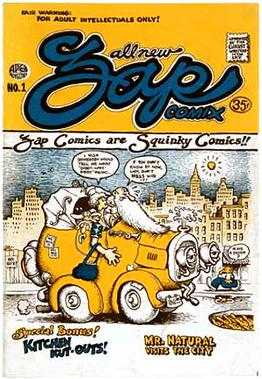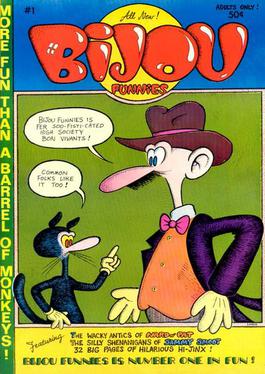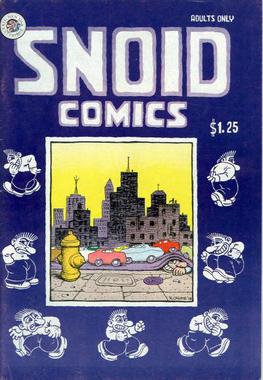
Underground comix are small press or self-published comic books that are often socially relevant or satirical in nature. They differ from mainstream comics in depicting content forbidden to mainstream publications by the Comics Code Authority, including explicit drug use, sexuality, and violence. They were most popular in the United States in the late 1960s and 1970s, and in the United Kingdom in the 1970s.
The Print Mint, Inc. was a major publisher and distributor of underground comix based in the San Francisco Bay Area during the genre's late 1960s-early 1970s heyday. Starting as a retailer of psychedelic posters, the Print Mint soon evolved into a publisher, printer, and distributor. It was "ground zero" for the psychedelic poster. The Print Mint was originally owned by poet Don Schenker and his wife Alice, who later partnered in the business with Bob and Peggy Rita.

Kitchen Sink Press was a comic book publishing company founded by Denis Kitchen in 1970. Kitchen Sink Press was a pioneering publisher of underground comics, and was also responsible for numerous republications of classic comic strips in hardcover and softcover volumes. One of their best-known products was the first full reprint of Will Eisner's The Spirit—first in magazine format, then in standard comic book format. The company closed in 1999.
Blab! was an anthology edited by Monte Beauchamp that featured a mixture of alternative comics and illustrated features focused predominantly on illustration, graphic design, and lowbrow art.

Denis Kitchen is an American underground cartoonist, publisher, author, agent, and the founder of the Comic Book Legal Defense Fund.

Jay Patrick Lynch was an American cartoonist who played a key role in the underground comix movement with his Bijou Funnies and other titles. He is best known for his comic strip Nard n' Pat and the running gag Um tut sut. His work is sometimes signed Jayzey Lynch. Lynch was the main writer for Bazooka Joe comics from 1967 to 1990; he contributed to Mad, and in the 2000s expanded into the children's book field.
Jay Kinney is an American author, editor, and former underground cartoonist. Kinney has been noted for "adding new dimensions to the political comic" in the underground comix press of the 1970s and '80s.
Rory Hayes was an American underground cartoonist in the late 1960s and early 1970s. His comics were drawn in an expressionistic, primitivist style and usually dealt with grim subject matter such as paranoia, violent crime, and drug abuse. In addition to his own titles, Bogeyman and Cunt Comics, he was published in many of the most prominent comics in the underground scene, including Bijou Funnies and Arcade.

Mr. Natural is a comic book character created and drawn by 1960s counterculture and underground comix artist Robert Crumb. First appearing in Yarrowstalks (1967), the character gained a following during the emergence of underground comix in the 1960s and 1970s, and has been extensively merchandised in various products.

Diane Robin Noomin was an American comics artist associated with the underground comics movement. She is best known for her character DiDi Glitz, who addresses transgressive social issues such as feminism, female masturbation, body image, and miscarriages.
Mervyn "Skip" Williamson was an American underground cartoonist and central figure in the underground comix movement. Williamson's art was published in the National Lampoon, High Times, the Realist, the Industrial Worker, the Chicago Seed, Encyclopædia Britannica and others. His best-known character is Snappy Sammy Smoot.

Bijou Funnies was an American underground comix magazine which published eight issues between 1968 and 1973. Edited by Chicago-based cartoonist Jay Lynch, Bijou Funnies featured strong work by the core group of Lynch, Skip Williamson, Robert Crumb, and Jay Kinney, as well as Art Spiegelman, Gilbert Shelton, Justin Green, and Kim Deitch. Bijou Funnies was heavily influenced by Mad magazine, and, along with Zap Comix, is considered one of the titles to launch the underground comix movement.

Donald Richard Donahue was a comic book publisher, operating under the name Apex Novelties, one of the instigators of the underground comix movement in the 1960s.
Leonard Rifas is an American cartoonist, critic, editor, and publisher associated with underground comix, comics journalism, left-wing politics, and the anti-nuclear movement. He is notable for his contributions to the form of minicomics as well as publishing Japanese manga in the United States. Rifas' publishing company, EduComics, operated most actively from 1976 to 1982.
Willy Murphy was an American underground cartoonist. Murphy's humor focused on hippies and the counterculture. His signature character was Arnold Peck the Human Wreck, "a mid-30s beanpole with wry observations about his own life and the community around him." Murphy's solo title was called Flamed-Out Funnies; in addition, he contributed to such seminal underground anthologies as Arcade, Bijou Funnies, and San Francisco Comic Book, as well as the National Lampoon.
Zavier Leslie Cabarga, popularly known as Leslie Cabarga, is an American author, illustrator, cartoonist, animator, font designer, and publication designer. A participant in the underground comix movement in the early 1970s, he has since gone on to write and/or edit over 40 books. His art style evokes images from the 1920s and 1930s, and over the years Cabarga has created many products associated with Betty Boop. His book The Fleischer Story in the Golden Age of Animation, originally published in 1976, has become the authoritative history of the Fleischer Studios.
Michele Wrightson, also known as Michele Brand, was an American artist who worked in the comic book industry. She started out as an underground comix cartoonist. Later, she made her name as a colorist. She was a key contributor to the first all-female underground comic, It Ain't Me, Babe, as well as its follow-up series, Wimmen's Comix.
Glenn Head is an American cartoonist and comic book editor living in Brooklyn, New York. His cartooning has a strong surrealist bent and is heavily influenced by 1960s underground comix.

The Snoid, occasionally referred to as Mr. Snoid, is an American underground comix character created by Robert Crumb in the mid-1960s. A diminutive sex fiend and irritating presence, the Snoid often appears with other Crumb characters, particularly Angelfood McSpade, Mr. Natural, and Crumb's own self-caricature.
ProJunior, sometimes styled as Pro Junior, is an American comics character created by Don Dohler in 1958. He debuted in a fanzine in 1961, and in underground comix in 1970. Known as "Baltimore's blasphemous bad boy", the character is unusual in the underground genre for being "shared" by a number of different creators, appearing in stories by Jay Lynch, Art Spiegelman, Skip Williamson, and Robert Crumb. His main period of popularity was from 1970 to 1972.









